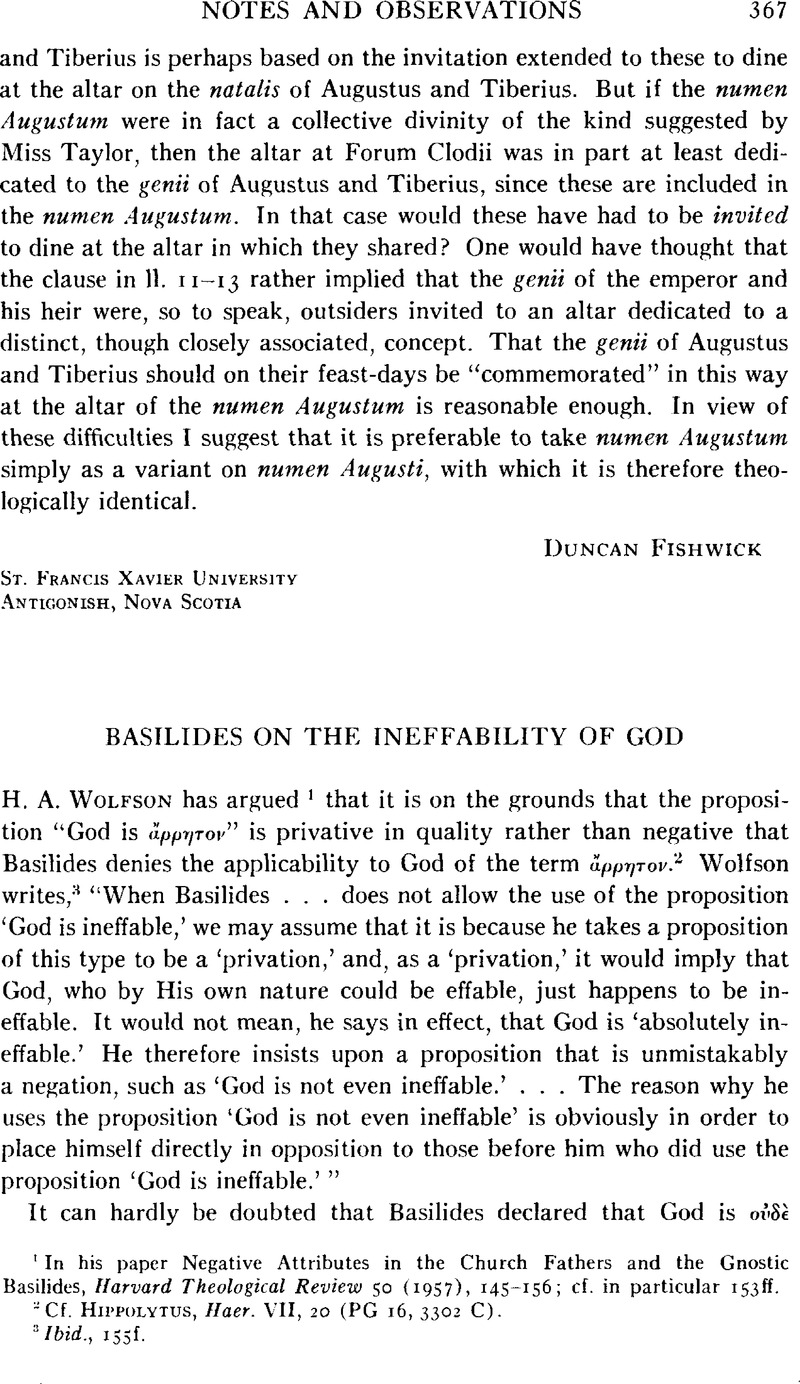Article contents
Basilides on the Ineffability of God
Published online by Cambridge University Press: 10 June 2011
Abstract

- Type
- Notes and Observations
- Information
- Copyright
- Copyright © President and Fellows of Harvard College 1969
References
1 In his paper Negative Attributes in the Church Fathers and the Gnostic Basilides, , Harvard Theological Review 50 (1957), 145–156Google Scholar; ef. in particular 153ft.
2 Cf. Hippolytus, , Haer. VII, 20 (PG 16, 3302 C)Google Scholar.
3 Ibid., 155f.
4 WOLFSON believes that in attacking the view that God is αρρητον Basilides had in mind specifically PHILO because ibid., 156) “the only one who before Basilides, that is, before the reign of Hadrian (117–138), is known to have used that expression is Philo.” WOLFSON'S argument is implausible. Rather, the fact that PHILO describes God as αρρητον leads one to suspect that the application of this term to God was commonplace in current speculation, and indeed this suspicion is confirmed by the evidence. In the Hermetic “Poimandres,” perhaps not later in date than the career of BASILIDES and certainly not revolutionary in the matter of terminology, God is invoked (Corpus Hermeticum led. A. D. NOCK] I, 31 II, 19, 2I) as άνεκλάλητε, αρρητον, σιωπή Πωνούμνε Furthermore, this usage of the term was commonplace in Middle Platonic speculation, where it was linked with PLATO'S statement (Ep. VII,. 541 C 5f.): ρετόν γάρ αύδαμως έστιν ως άλλα μαθήματα; for a full survey of the evidence on this point see Danielou, J., Message Evangelique el Culture Hellenistique (Tournai, 1961), 110 and 304–06Google Scholar. Again, a Neopythagorean work ascribed to the Early Pythagorean Lysis, which can hardly be later in date than BASILIDES, described God as άριθμόν αρρητον cf. Athenagoras, , Suppl. 6Google Scholar(PG 6, 901 A): Aύσις…άριθμόν αρρητον όρίΖεται τόν θεόν.
5 Already PHILO had succumbed to this tendency; cf. V. contempt. 2 (ἐΠαιδεύθησαν θεραπεύειν τό ὅν, ὅ καί ἀγαθοῦ κρείττόν ἐστιν καὶ ἐνὸς είλικρινέστερον καί μονάδος ὰρχεγονώτερον), Pream. 40 (ἐκείνο μὲν γάρ, ὃ καί άγαθού κρείττον καί μονάδος πρεσβύτερον καί ἐνὸς εἰλικρινέστερον), Opif. 8 (κρείττων κρείττων [sc. ό τών ὃλων νούς] ἤ ἀρετή, καί κρείττων ἤ ἐπιστήμη, καί κρείττων ἤ αύτὸ τὸ ἀγαθὸν καὶ αύτὸ τὸ καλόν), Leg. ad Gaium (τὸκρείττον μὲν ὰγαθού, κάλλιον δὲ καλού, καί μακαριοτητος μὲν μακαριώτερον, εὒδαιμονίας δὲ αὐτής εὐδαιμονέστερον, καὶ εί δή είρημένων τελειότερον), Qu. Gen. II, 54. Cp., eg., Corpus Hermeticum 1, 31 (1, 18, 9): ἂγιος τἶ, ό πάσης ὑπεροχής μεζων
6 Grant, R. M. (Gnosticism and Early Christianity [revised ed., New York, 1966], 144f.)Google Scholar recognizes that BASILIDES’ starting point is Ephesians 1, 21 rather than ARISTOTLE. Nevertheless, GRANT accepts WOEFSON'S main thesis, that BASILIDES, in dependence upon ARISTOTLE, regarded the expression “God is ineffable” as a privation.
7 WOLFSON comments on HIPPOLYTUS’ final remarks as follows (ibid., 156): “It is not clear what he (sc. Hippolytus) means by this statement. If he means that, besides negative predications, Basilides and his son allowed also affirmative predications, provided only that the positive terms affirmed of God were taken in an equivocal sense, then Basilides may be considered as being the first to introduce the equivocal interpretation of divine predicates.” WOLFSON'S claim seems extravagant. HIPPOLYTUS'S account suggests no more than that BASILIDES stressed the dangers attached to όμωνυμία (ταραχέν έμπεεποίείεκε καί πλάνεν των ραγμάτων).
8 It is not apparent that BASILIDES regarded αρρητον as equivocal, but he might with good reason have done so. For the various meanings of the word see LSJ s.v.
9 See Gnosticism: An Anthology, ed. Grant, R. M. (London, 1961), 71Google Scholar.
10 Praem. 30: ὂτῳ δ ἐξεγἐνετο πάντα μὲν σῷματα πάντα δ ἀσώματα ὑπτεριδείν καί ὑπερκψαι, μόνῳ δ ἐπερείσασθαι καί στηρίσασθαι θεῷ μετ ίσχυρογνώμονος λογισμού καί ἀκλινούς καί βεβαιοτάης πίστεως, εὐδαίμων καί τρισμκάριος οὖτος ὡς ἀληθώς
11 Ep. 58, 11: Dicimus enim quaedam corporalia esse, quaedam incorporalia. quid ergo erit, ex quo haec deducantur ? illud, cui nomen modo parum proprium inposuimus, ‘quod est.’ Cf. Thkileh, W., Die Vorbcreitung drs Neuplatonismus (rp. Berlin/Zurich, 1964), 1ffGoogle Scholar.
12 Strom. V, 11 (PG 9, 109 A): εἰ τοίνυν, ἀΦελόντες πάντα ὃσα πρόσεστι τοίς σὠμασι, καὶ τοίς λεγομένοις ὰσωμάτοις, ἀπορρίψωμεν ἑαντοὐς εἰς τὸ μέγεθος τού Χριστού
13 Comm. in Jo. XIII, 21 (PG 14, 432 C): πολλών πολλὰ περί τού θεού ὰποΦηαμὲνων, καὶ τής οὐσίας αὐτού, ὣστε τινὰς μὲν εἰρηκέναι καί αὐτὸν σωματικης Φύσεως λεπτομρούς καί αίθερώδους, τινὰς δὲ ἀσωμάτον, καὶ ἂλλους ὑπὲρ ἐκείνα οὐσίας πρεσβεία καί δννάμει
14 Quaest. Graec. (PG 6, 1469 C): καί τὸ θείόν Φαμεν εἶναι ἀσώματον, οὐχ ὃτι ἔστιν άσώματον (ἐπεκεινα γάρ ἐστιν ὀ θεός τή αὐτού οὐσιᾳ, ὣσπερ τού σώματος, οὓτω καὶ τού ἀσωμάτου, ὠς ἐκατίρον τούτων ὐπάρχων δημιουργός. γὰρ ἐποίησεν ὁ θεός ἄ αὐτὸς ὑπάρχει
15 Corpus Hermeticum 4, 5 (I, 51, 5f.): καταΠρονήσαντες πάντων των σωματικων καί άσωμάτων ήπί τό έν καί μόνόν σπεύδουσιν.
16 The only exception known to me from the literature of the relevant period is ALBINUS, Didasc. 10, p. 165 H.: ούτε ποίν…ούτε άποιον ού γάρ έστέρηταί τινος έπιβάλλοντος αύτω ποιού.
- 2
- Cited by


